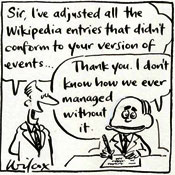Wikipedia: Credible Research Source or Not?
Question

How do I get students to realize that Wikipedia should not be used as a credible source (especially as they enter college), even though some of the information is factually accurate?
Answer
Wikipedia founder Jimmy Wales is quite clear about the uses of Wikipedia. Asked, "Do you think students and researchers should cite Wikipedia? during an interview with Business Week in 2005, he replied, "No, I don't think people should cite it, and I don't think people should cite Britannica, either... People shouldn't be citing encyclopedias in the first place. Wikipedia and other encyclopedias should...give good, solid background information to inform your studies for a deeper level."
That said, Wikipedia entries are generally in the forefront of preliminary web research on almost any topic. And teaching students to look critically at the reliability and credibility of any information source is fundamental to the educational process. Figuring out how to evaluate the encyclopedia, then, is one excellent starting point for teaching students how to assess massive amounts of information they're likely to encounter online both for school work and personal exploration. Wikipedia itself is strong on self-assessment. Encyclopedia editors address accuracy in the entry Reliability of Wikipedia, compiling the results of international third-party assessments across a variety of disciplines. The consensus: the encyclopedia is as accurate as other encyclopedias. And as Cathy Davidson, Professor of Interdisciplinary Studies at Duke University, points out in We Can't Ignore the Influence of Digital Technologies (Chronicle of Higher Education, March 23, 2007), unlike comparable print sources, Wikipedia errors can be corrected and often are in a matter of hours after publication.
While accuracy may not be Wikipedia's major deterrent, the collaborative nature of the wiki invites greater scrutiny and analysis. Here, again, Wikipedia helps users navigate the perils, pitfalls, and strengths of open, collaborative scholarship. Researching with Wikipedia points out that few articles are of encyclopedic quality when they first appear—they may be unbalanced, biased, and incomplete, and it takes time for contributors to find consensus. Wikipedia for Academic Use advises users to explore whether articles represent widespread norms or minority viewpoints. Each of Wikipedia's own articles fostering critical thinking includes links to further analysis and comment on the encyclopedia's value and utility.
The National Writing Project White Paper Wikipedia: Friend, Not Foe suggests teaching students how entries on the site change and about the transparency with which each change is debated. "Wikipedia’s transparent and participatory nature invites visitors to question what they’re reading in ways that static, expert-driven reference texts do not." The article provides a site guide to Wikipedia, examples of classroom discussion and activities with Wikipedia, and a bibliography of further resources. Wikipedia in the Classroom at Finding Dulcinea also offers annotated links to classroom resources related to teaching students how to approach and use Wikipedia and to lesson plans.